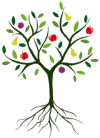Saint Edmund's Russet
Saint Edmund's Russet (sometimes known as St. Edmund's Pippin) is one of the best English russet apple varieties. It looks superb with its dull matt russet colouring, and tastes great.
The flavour is arguably richer than its better-known compatriot Egremont Russet, and noticeably juicier.
Saint Edmund's Russet apple trees for sale
1-year bare-root
tree
on MM106 rootstock£34.95
Mature height: 3m-5m after 10 years
Can be trained on as a large free-standing apple tree, a half-standard apple tree, a large apple fan or espalier, or a pleached apple tree. Available next season
Growing and Training
Saint Edmund's Russet is a good garden apple variety, it crops reliably and grows in a wide range of conditions. Like many russet varieties, it has some natural resistance to many of the main apple diseases. It is a good choice for growers in areas of high rainfall.
The only thing to look out for is that it can be a partial tip-bearer - some apples are borne on the ends of shoots rather than the more usual short fruit-bearing spurs. For this reason it is best to keep pruning to a minimum, to avoid accidentally pruning the fruit-bearing tips of shoots.
Recommended pollinators for Saint Edmund's Russet apple trees
Saint Edmund's Russet is partially self-fertile, so you do not need another variety to pollinate it to produce fruit.
However you will get a better crop if you plant any of the following pollinator varieties nearby.
If you are not sure about pollination requirements don't hesitate to ask us.
ScrumptiousScrumptious is a modern award-winning early-season English dessert apple.
SpartanSpartan produces lots of crimson maroon apples, crunchy, sweet, easy to grow, delicate "vinous" flavour.
Red FalstaffRed Falstaff is one of the best garden apple trees, heavy crops, easy to grow, and very juicy.
SunsetSunset is a popular garden alternative to Cox, easier to grow, with a sweet aromatic flavour.
James GrieveJames Grieve is the classic Scottish dual-purpose apple. It can be eaten fresh, and is also excellent for juicing and cooking.
FiestaFiesta (or Red Pippin) is one of the best Cox-style apples, easy to grow, with a good aromatic flavour.
Red DevilRed Devil is a good apple variety for the UK garden, and produces a sweet red-tinted juice.
GreensleevesGreensleeves is a reliable and popular mid-season green/yellow apple, easy to grow and productive.
History
Raised by Mr Harvey of the town of Bury St. Edmunds, in the county of Suffolk, England, in 1875.
Saint Edmund's Russet characteristics
- Gardening skillBeginner
- Fruit persistenceNormal ripening
- Self-fertile?Partially self-fertile
- Pollinating othersAverage
- Pick seasonMid
- Picking periodmid-September
- Keeping2-3 weeks
- Food usesEating freshJuiceHard cider
- Country of originUnited Kingdom
- Period of origin1850 - 1899
- Fruit colourRusset
You might also like these varieties
Ashmead's KernelA versatile English 17th century russet apple, Ashmead's Kernel is noted for its distinctive pear-like flavour.
Egremont RussetEgremont Russet is the most popular English russet variety, and a good apple tree for the garden.
Herefordshire RussetHerefordshire Russet is a modern russet apple variety, with an excellent strong Cox-like flavour.
More about apple trees
Apples are very versatile, and all varieties can be eaten or used in the kitchen. However varieties specifically grown as eating apples tend to have the best flavours for eating raw.
The main thing to decide when choosing an eating apple is when you intend to eat the apples. Early season apples are typically ready in August, and generally don't keep very long. Mid-season apples are ripe in early September, while late-season apples start to become ripe in late September and October. Many of the late-season varieties can also be stored in a fridge or cold shed for several months into the winter.
Some apple varieties are self-fertile, but most are not. However in most areas of the UK you do not need to worry whether your apple trees are self-fertile or not, as there will be other apple trees in nearby gardens to help with pollination.
